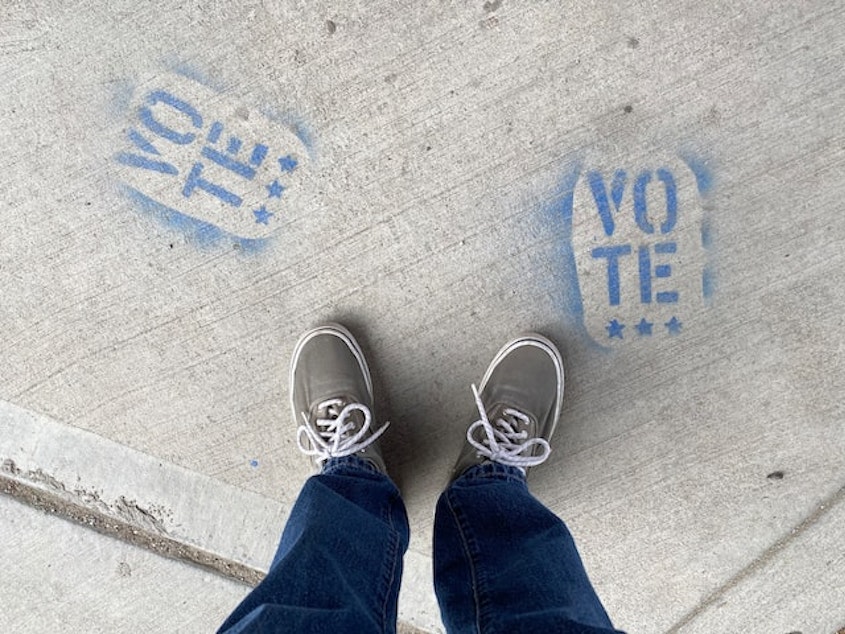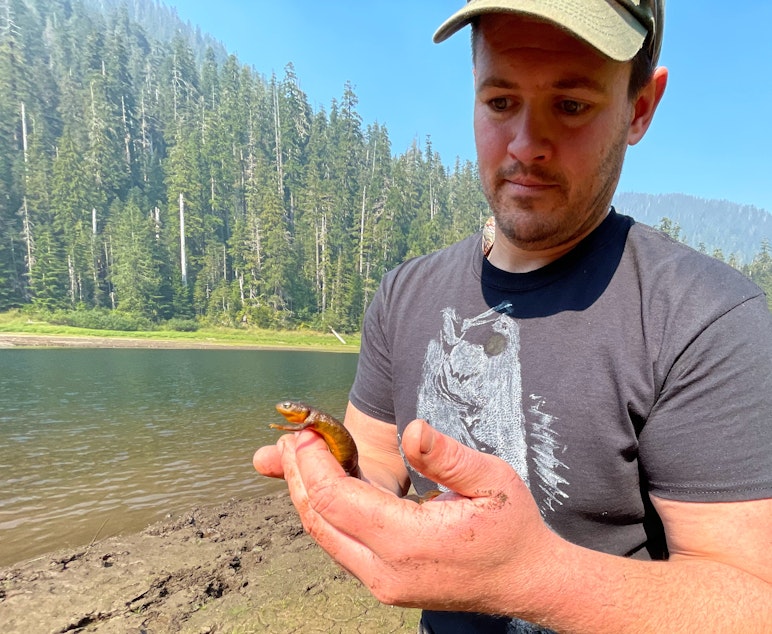Why the polls were way off: Today So Far

A red wave didn't happen as some predicted. In Washington, races were not as close as many expected.
This post originally appeared in KUOW's Today So Far newsletter for November 16, 2022.
As Lloyd Christmas would say, once again the polls leading up to the election were "way off!"
"The fact that there is such a difference between the Republican polls and the others indicates something is going on there, and I'm not imagining that they're all sitting in a dark room someplace and making up numbers ... polling comes down to who you ask and what you ask," said Stuart Elway, director of the Crosscut/Elway Poll of Washington voters.
Going through some post-election analysis with KUOW's Angela King, Elway says there are a few reasons why the polls miscalculated things: a lot more younger residents voted than expected, and the people who pollsters spoke with probably weren't the best sample groups. A big reason, however, is that many polls skewed toward the political direction of the groups behind them, and Republicans produced a lot of polls.
Take the Senate race between Democrat Patty Murray and Republican Tiffany Smiley. Elway notes that there were 19 polls after the August primary, 10 of which were conducted by GOP-affiliated groups. Six of the final eight most recent polls were from Republican-leaning organizations. They all put Smiley in a much better position than she ended up having in the election. Other polls from Democrat-leaning groups or media outlets didn't have Smiley as far ahead.
"So I think the Republican-leaning polls skewed the polling averages that everybody looks at and made it look a lot closer than it was. It turns out that was a mirage. Tiffany Smiley ended up with the same vote Loren Culp got for governor two years ago, and Patty Murray got her average reelection vote."
Sponsored
Fueling all these voters were a few key issues. Elway points out that the economy was a top priority for most voters. Abortion came in second. A lot of reporters and pollsters focuses on those two, but there was another issue layered on top of it all: the future of our democracy. That's where independent voters came in.
There is another issue that the GOP may have to reckon with in the coming years — a certain corner of its party, and their rhetoric, which speaks to this democracy concern. Sure, disagree or agree with them, you can dig up some reasonable, sane-sounding, willing-to-work-with-you Republicans from Tim Scott to Lisa Murkowski, or the Mainstream Republicans of Washington. But Republicans also have characters like Marjorie Taylor Greene, Kari Lake, or Herschel Walker who are much louder and claim a lot more headlines and SNL sketches. This attention-getting corner is where conspiracies and 2020 denialism seem to take root. That's my observation, but Elway argues that the issue of supporting our democracy and elections was indeed influential.
"When people got to the polls, they're thinking about abortion and the future of democracy ... Let's fix democracy first and then we'll fix the issues after that," Elway said. "I think that was a large part of the swing vote, and those suburban women we keep talking about always made up a large section of the swing vote. I think that is how it ended up swinging."
You could probably place Joe Kent in that latter group of GOP candidates I listed above. He came into the election with an endorsement from Trump, and he questioned the 2020 election results.
It appears that he won't win in his bid for Washington's 3rd Congressional District, but has not yet conceded (he has already started flirting with election conspiracy theories). A few polls put Kent in the lead ahead of the election. Still, Democrat Marie Gluesenkamp Perez managed to flip the 3rd District from red to blue and is already in DC preparing to get to work.
Sponsored
"Her campaign really billed her as a rural Democrat ... they were definitely trying to put a lot of emphasis on places like Cowlitz County, Lewis County, places that Democrats don't historically win. In fact, they did not quite make the gains that they thought they were going to make there. It just so happens they really made up for it in Clark County, which largely leans more Democrat," OPB's Troy Brynelson told Seattle's Morning News.
Brynelson notes that there was still a shake up among Republicans in this district.
"We can look at the ballot results in Clark and see that there were at least 8,000 people who voted for Republican Senate candidate Tiffany Smiley, who did not vote for Kent ... it is clear that there is a certain sect of Republicans in Clark County, and this district, who Kent's message did not resonate with."
"Election integrity," which turned into a codeword for questioning the 2020 election, could be part of what didn't resonate, along with other approaches Kent's campaign took. Brynelson said that after Kent ousted incumbent Republican Jaime Herrera Beutler in the August primary, many thought that he would move more to the center for wider voter appeal. That's a move that Smiley made after the primary — she backed away from anything close to election denial, for example.
But Kent maintained a "consistently far-right, Conservative platform," Brynelson said. "A lot of their messaging was around ... election integrity. Kent very openly denied the results of the 2020 election. He took a hardline stance on immigration."
Sponsored
"There were 49,000 voters who supported Herrera Beutler in the primary who were just sitting there, and Kent never really seemed to try to meet them in the middle. And that, I think, is what the Gluesenkamp Perez campaign would point to as to one of the main reasons they were able to (win), is because they made the effort to come closer to the middle. They ran a very left-of-center campaign while Kent stuck to his guns."
Check out Brynelson's full conversation with Seattle Now here.
AS SEEN ON KUOW

Washington Department of Fish and Wildlife biologist Max Lambert holds a pair of rough-skinned newts at a lake on the Olympic Peninsula on Sept. 9, 2022. He has been keeping an eye on a remote lake on the Olympic Peninsula, where a once-abundant amphibian has been turning up dead, littering the lakeshore with tiny carcasses. Something is killing the lake’s population of rough-skinned newts. Amphibian populations in much of the world have been collapsing, in what has been dubbed the “amphibian apocalypse.” (Courtesy of Kathleen Lumiere)
Sponsored
DID YOU KNOW?
What are you planning for your Thanksgiving meal? According to one of our region's largest grocery chains, there are three side dishes most tables are going to feature in the Northwest.
Looking over past Thanksgiving sales, Kroger (QFC, Fred Meyer) says three side dishes are most popular in the Northwest: Potatoes (mashed, baked, you name it); roasted vegetables (onions, turnips, beets, radishes, carrots); and cranberries (canned or fresh).
Planning ahead of Thanksgiving this year, Kroger says it expects to sell more than 300,000 cans of cranberry sauce and 186,000 bags of fresh cranberries. It also estimates it will sell three million pounds of potatoes and more than one million pounds of sweet potatoes.
ALSO ON OUR MINDS
Sponsored

After a night of uncertainty, NASA's Artemis moon rocket takes to the skies
This white, bell-shaped capsule, called Orion, has now embarked on a 25-day test flight that will take it around the moon and back. The approximately 1.2-million-mile trip will bring NASA one step closer to achieving its goal of returning humans to the lunar surface.

